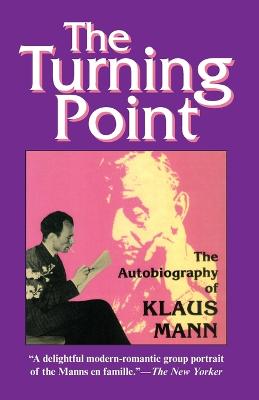Reviewed by brokentune on
I nearly started this post pointing out again that Klaus Mann's literary output has always suffered from being overshadowed by the works of his father. But really, whilst this is true, I don't want to lead the discussion into a comparison of Klaus and Thomas because I personally have a much higher regard for Klaus' writing. He was a master satirist, a sensitive observer, and at the same time he had a passion for making a point.
The Turning Point is partly a memoir and partly a historical sketch describing both the Mann household and the political and social events that shaped the family and the first half of the 20th century. Klaus' wit shines through at the beginning of the book, but the latter parts are full of his disdain of German politics during the rise of Nazism, which eventually lead him to be utterly frustrated with German society which cast him out and which he could not return to. Even on his return to Germany from exile at the end of the war, he could no longer fit in - because people had changed. There was no going back.
I highly recommend this book to anyone who has an interest in the Mann family or the detail of political and cultural life in Germany during the 1920s and 30s. My recommendation does, however, come with a caveat: I did get the impression that Klaus was not the most reliable of narrators. It is not that I felt he was deliberately misleading, but in the first instance, he was a novelist and a dramatist, and I got the impression that at times poetic licence may have prevailed over research or analysis.
Still, it is a a fascinating read and we do get to find out why Thomas Mann was referred to as "the magician":
"He came to see us at bedtime - a rare event in itself! - and developed his proposed strategy. The decapitated guest, he suggested, wasn't really so frightful. He tried to get the better of us by sheer bluff. "Just don't look at him when he comes again!" he advised us. "Then he'll probably vanish. If he still annoys you ask him politely to beat it. Tell him that a children's bedroom is no place for a decent phantom to hang out and that he should be ashamed of himself. This may be enough to get rid of him, but if he still hesitates, you may warn him that your father is very irritable and just doesn't like to have ugly spooks in his house. At this point he'll disappear without making any more fuss. For it is a well-known fact in ghostly circles that I can make myself very unpleasant, indeed."
We followed his advice and the spook presently dissolved. It was an imposing proof of Father's almost superhuman insight and influence. From that time on we began to call him "Zauberer" - magician."
Reading updates
- Started reading
- 25 April, 2015: Finished reading
- 25 April, 2015: Reviewed
